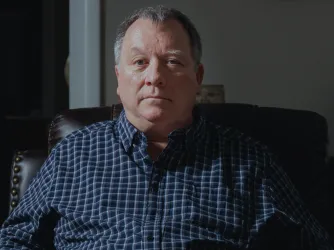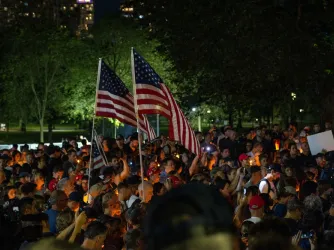Table of Contents
Banned Books Week: Authors speak out against censorship

Yesterday, FIRE announced an exciting new resource for our First Amendment Library: Banned and Challenged Books. Today, we’re continuing our celebration of Banned Books Week by taking a look at how some well-known authors responded when their books faced censorship.
Listed below are excerpts from authors’ letters to those defending — or censoring — their books. Their words serve as a necessary reminder of the value books offer and what we stand to lose when we allow them to be banned or burned.
John Irving wrote this 2008 letter to Pam Harland, a librarian who fought to keep Irving’s book “The Hotel New Hampshire” on shelves at Plymouth High School in New Hampshire:
I thank you for having the courage to stand up for a novel that is utterly sympathetic to young people. As you know, the last so-called Hotel New Hampshire (at the end of the novel) is, in reality, a rape-crisis center, a place to counsel victims—most of whom are young. I wonder if the staff member who found my novel offensive actually read that far, or if the incest issue—or the sexual explicitness, of the four-letter words in the dialogue—was sufficient to impede their progress. (Real readers finish books, and then judge them; most people who propose banning a book haven’t finished it. In fact, no one who actually banned Salman Rushdie’s “The Satanic Verses” even read it.)
In 1973, Kurt Vonnegut wrote to Charles McCarthy, head of the school board at North Dakota’s Drake High School, in response to McCarthy’s decision to burn 32 copies of “Slaughterhouse-Five” in the school’s furnace:
If you were to bother to read my books, to behave as educated persons would, you would learn that they are not sexy, and do not argue in favor of wildness of any kind. They beg that people be kinder and more responsible than they often are. It is true that some of the characters speak coarsely. That is because people speak coarsely in real life. Especially soldiers and hardworking men speak coarsely, and even our most sheltered children know that. And we all know, too, that those words really don’t damage children much. They didn’t damage us when we were young. It was evil deeds and lying that hurt us.
After I have said all this, I am sure you are still ready to respond, in effect, “Yes, yes–but it still remains our right and our responsibility to decide what books our children are going to be made to read in our community.” This is surely so. But it is also true that if you exercise that right and fulfill that responsibility in an ignorant, harsh, un-American manner, then people are entitled to call you bad citizens and fools. Even your own children are entitled to call you that.
I read in the newspaper that your community is mystified by the outcry from all over the country about what you have done. Well, you have discovered that Drake is a part of American civilization, and your fellow Americans can’t stand it that you have behaved in such an uncivilized way. Perhaps you will learn from this that books are sacred to free men for very good reasons, and that wars have been fought against nations which hate books and burn them. If you are an American, you must allow all ideas to circulate freely in your community, not merely your own.
If you and your board are now determined to show that you in fact have wisdom and maturity when you exercise your powers over the education of your young, then you should acknowledge that it was a rotten lesson you taught young people in a free society when you denounced and then burned books–books you hadn’t even read. You should also resolve to expose your children to all sorts of opinions and information, in order that they will be better equipped to make decisions and to survive.
Harper Lee sent the following letter to The Richmond News Leader in 1966, upon learning that Virginia’s Hanover County School Board removed all copies of “To Kill a Mockingbird” from its school libraries, and offered a donation to the Beadle Bumble Fund — which provided copies of banned books to children without access to them:
Recently I have received echoes down this way of the Hanover County School Board’s activities, and what I’ve heard makes me wonder if any of its members can read.
Surely it is plain to the simplest intelligence that “To Kill a Mockingbird” spells out in words of seldom more than two syllables a code of honor and conduct, Christian in its ethic, that is the heritage of all Southerners. To hear that the novel is “immoral” has made me count the years between now and 1984, for I have yet to come across a better example of doublethink.
I feel, however, that the problem is one of illiteracy, not Marxism. Therefore I enclose a small contribution to the Beadle Bumble Fund that I hope will be used to enroll the Hanover County School Board in any first grade of its choice.
In 2007, Pat Conroy wrote to The Charleston Gazette to address reports that his books “The Prince of Tides” and “Beach Music” were banned by West Virginia’s Kanawha County schools after complaints from parents:
People cuss in my books. People cuss in my real life. I cuss, especially at Citadel basketball games. I’m perfectly sure that Steve Shamblin and other teachers prepared their students well for any encounters with violence or profanity in my books just as Gene Norris prepared me for the profane language in The Catcher in the Rye forty-eight years ago.
The world of literature has everything in it, and it refuses to leave anything out. I have read like a man on fire my whole life because the genius of English teachers touched me with the dazzling beauty of language. Because of them I rode with Don Quixote and danced with Anna Karenina at a ball in St. Petersburg and lassoed a steer in Lonesome Dove and had nightmares about slavery in Beloved and walked the streets of Dublin in Ulysses and made up a hundred stories in The Arabian Nights and saw my mother killed by a baseball in A Prayer for Owen Meany. I’ve been in ten thousand cities and have introduced myself to a hundred thousand strangers in my exuberant reading career, all because I listened to my fabulous English teachers and soaked up every single thing those magnificent men and women had to give. I cherish and praise them and thank them for finding me when I was a boy and presenting me with the precious gift of the English language.
The school board of Charleston, West Virginia, has sullied that gift and shamed themselves and their community. You’ve now entered the ranks of censors, book-banners, and teacher-haters, and the word will spread. Good teachers will avoid you as though you had cholera. But here is my favorite thing: Because you banned my books, every kid in that county will read them, every single one of them. Because book-banners are invariably idiots, they don’t know how the world works—but writers and English teachers do.
And in 2013, Isabel Allende wrote to members of North Carolina’s Watauga County Board of Education to make the case for her book “The House of the Spirits,” which was facing a review after a parent complained about its content:
I find myself in the unusual and awkward position of having to “defend” my novel The House of the Spirits that risks being banned from a high school in Boone, North Carolina. Banning of books is a common practice in police states, like Cuba or North Korea, and by religious fundamentalist groups like the Taliban, but I did not expect it in our democracy.
No student is forced to read the book. Teachers like to teach it because they believe it gives the students insights into Latin American literature, history, politics, social issues, and customs. They usually offer their students other options but most students choose the book, they enjoy it and often they write to me. Their comments prove that they have understood the story and they are curious to learn more. The novel seems to open their minds to other places and peoples in the world.
[ . . . ]
As you know, it takes just one parent who disapproves of a book to pressure the school and eventually the Board of Education. In this case one person has circulated fragments of the novel—taken out of context—among parents who probably have not read the book. The fragments refer mostly to sexual content. The plan is to gather support to ban the book completely, even as optional reading. Since today TV series, movies, videogames and comics exploit sex and violence, including torture and rape, as forms of entertainment, I don’t think that young adults will be particularly offended by the strong scenes from The House of the Spirits, which are always part of the historical and political content of the novel.
Check back later this week for further discussion of Banned Books Week and, in the meantime, consider reading a banned book you wouldn’t normally think to pick up — there’s plenty to choose from.
Recent Articles
Get the latest free speech news and analysis from FIRE.

LAWSUIT: Ex-cop sues after spending 37 days in jail for sharing meme following Charlie Kirk murder

‘Let them sue’: Iowa lawmakers scoffed at First Amendment in wake of Charlie Kirk shooting, records show

City Club of Cleveland rejects illiberal calls to disinvite speaker
